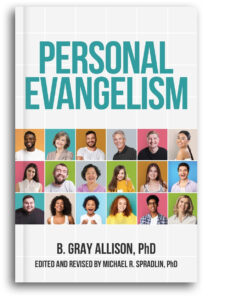How to Engage in Personal Witnessing
Editor’s note: Many people want to share their faith, they just are not sure how to begin and what to say. This extremely practical guidance on how to make the approach in soul-winning was written by Mid-America’s founder and former President, the late Dr, B. Gray Allison several decades ago. But it is still just as relevant and practical today as ever. A more complete version of this information can be found in Dr. Allison’s brief booklet, Winsome Words for Willing Witnesses.
How does one make an approach to a lost person so that you can use the Word of God and witness? It cannot be said too often that there is no substitute for the use of the written Word of God in witnessing. This truth does not mean that the Bible is a charm or something magic, but it does something to a person to see written down in God’s Word the truth about himself, his need, what can be done about it, and how to do it. So, use a Bible or a New Testament in witnessing. How does one begin the interview to witness to a lost person?

There is a good method which has proved successful. It works with a person whom you know well or a person you have never seen before. Start a casual conversation. Talk about something pleasant. Get on a friendly basis but do not let the conversation stay casual. You can start anywhere in any conversation and use four simple things.
One: “Have you been thinking much about spiritual things?” It does not matter what you are talking about, you can just start. Whatever he answers you can go immediately to the second thing. “What would you say is a person’s greatest spiritual need?” Whatever he says you can go immediately to the third thing. “The Bible says that it is a salvation experience. Have you had a definite experience with Christ sometime in the past?”
Notice what was said. “Have you had a definite experience with Christ sometime in the past?” Now suppose he says “yes” to that question, what would you say? “Tell me about it! I like to hear people tell about what Jesus has done for them.” If he answers “no” or does not say, then ask, “May I talk with you about this for a few minutes?” Start right then. Go to the Scripture and talk with him.
Another way to begin is to ask: “Have you come to the place in your life that you know for certain that if you died today you would go to Heaven?” If he says “yes,” ask him how he knows. If the answer is not clear, ask, “May I show you what the Bible says?” If his answer is “no,” ask: “May I show you what the Bible says?”
Another approach that really opens the door is to ask the person, “Have you ever been to a doctor? If you go to the doctor and are not well, what does he do? First, he tries to find out what is wrong with you. When he finds out what is wrong with you, he prescribes for you. He tells you what to take and how to take it. This is what God does in the Bible. He tells us what is wrong with every one of us. He tells us what to do about it, He tells us how to do it, but He never makes us do it. It is up to us to do the thing which will make us right with Him. May I show you what God says is wrong with every one of us?”
Then go immediately to the Scripture. I would suggest that you mark your Testament or Bible so that you can turn immediately to the Scriptures. Let me suggest an outline of the plan of salvation. The first verse is Romans 3:10, “As it is written, there is none righteous, no, not one.” Nobody is perfect.
Go to the second verse, Romans 3:23, “For all have sinned and come short of the glory of God.” The word all means every person in the world has sinned. Talk with this person about specific sins. For instance, “Have you ever told a lie? Have you ever stolen anything? Did you always obey your parents?” Questions like that to make him realize that he personally has sinned against God. Then, turn to the third verse and tell him that God says sin does something to us. Isaiah 59:2, “But your iniquities have separated between you and your God, and your sins have hid His face from you, that He will not hear.” Say, “So, ‘iniquities,’ that is warped, twisted, crooked things, or sin, separates us from God. It will keep us separated forever unless it is taken away.”

You may illustrate this by putting a piece of paper between your fingers and saying, “This piece of paper separates my fingers from each other. How can my fingers get together? They can get together only if the thing which separates them is removed. Sin separates you from God, and you cannot get to God until the sin which separates you from God is removed. Sadly, we cannot remove our own sins.”
The next verse is Romans 6:23 which says, “The wages of sin is death…” Sin has a payday. One day sin will pay off, and it will pay off in death, spiritual death, eternal separation from God. So that is what sin does.
But God has done something for us that we cannot do for ourselves. John 3:16, “For God so loved the world that He gave His only begotten Son, that whosoever believeth in Him should not perish, but have everlasting life.” You can make that personal. Where it says the “world,” put his name in there. Where it says “whosoever,” put his name in there. It means that God so loved this particular person that He sent Jesus to die for his sins.
Just tell him that if you go to the doctor and he tells you what is wrong and tells you the remedy but does not tell you how to take the remedy, that is not enough. For God to tell us that sin separates us from God and will keep us separated forever unless it is taken away, and that Jesus is the one who can take away sins through His death on the cross is not enough. We must know how to have Jesus in our lives.
The next Scripture is Acts 20:20–21. Paul wrote, “And how I kept back nothing that was profitable unto you, but have showed you, and have taught you publicly, and from house to house, testifying both to the Jews, and also to the Greeks, repentance toward God, and faith toward our Lord Jesus Christ.”
Explain to him that repentance means a change of mind that leads to a change of direction. So, a person must realize he has sinned, that he is moving away from God, and willingly, deliberately, knowing what he is doing, choose to turn from sin and turn to God. When he does this, he runs into that wall of sin which he has created between himself and God. Demonstrate that with that paper between the fingers.
Then tell him that the second thing is faith. Faith means commitment. A person commits himself to Jesus Christ the Lord. That is, he gives his life to Jesus so that it is never his again and so that he is never the ruler of it again. He makes Jesus Christ Lord of his life to be Lord forever, and then Jesus takes away the sin.
This is the place to draw the net and ask the person if he realizes he has sinned against God, if he understands what sin does, if he desires to turn from sin and give his heart and life to Jesus Christ. Then you may lead him in a prayer to God.
You surely do not want to leave him without explaining to him what he needs to do after he has committed his life to Christ. I suggest that you use the little tract that the Seminary has, “God Wants You To Know.” In the last section are six things that a person should do after he has trusted Christ. If you go through these with him and get him to agree to do these six things, he will be off to a good start in his Christian life.
